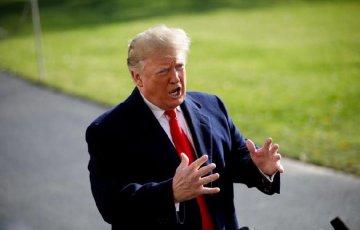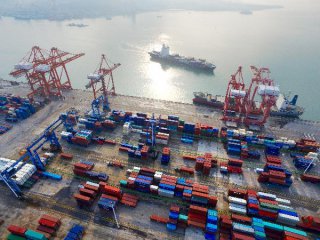
Trade war or not, one thing is clear, according to many experts: The global importance of the Chinese yuan seems destined to rise.
Strategists and economists say flows in the currency will grow over the long term if China continues to gradually open its financial system and further pushes use of the yuan internationally.
But it won't all be smooth sailing, and a gap in Chinese authorities' willingness to allow more funds into the country is likely to remain.
Chi Lo, senior economist for Greater China at BNP Paribas Asset Management in Hong Kong, said that the yuan will become more globally important as China further allows foreign capital into the country through selective financial opening and pursues its Belt and Road Initiative trade project, part of a policy to strengthen the country's international standing.
"So if you look along that direction there's no way the yuan can be a weak currency, otherwise people won't accept it and it cannot be a global currency if it's a weak currency in the long term," Lo told CNBC on Monday, projecting about a time frame of two or three decades.
HSBC, meanwhile, said in a report released Thursday that markets have been focused on the trade war between China and the United States as the main factor affecting the yuan. But, it said, China's opening of its financial markets is "probably the more important and enduring influence" on the currency.
"The (yuan) will be increasingly driven by capital account flows, and not just trade-related flows," the bank said.
'Multi-year trend'
China's economic transformation kicked off 40 years ago when the Communist Party introduced a policy of "reform and opening up" to the outside world.
That marked the initial step in what eventually took the country from a poor and agrarian nation to the industrial and technological giant of today that rivals the United States for global influence.
That process has been quite gradual and tightly controlled. That is likely to continue, Lo said, calling China's capital account opening "asymmetric" — meaning it allows more capital in than going out.
Authorities, for example, still keep a tight grip on the yuan, allowing it to trade only narrowly even if movements have gradually widened. The currency is ranked far behind its major global peers in how much it is used.
Global financial transfer system SWIFT said in its most recent monthly report on the yuan that it was the sixth most used currency in domestic and international payments value in October, just behind the Canadian dollar.
But HSBC stressed that China's financial opening accelerated this year, with portfolio investments by foreigners reaching an all-time high.
And with foreign buying of Chinese stocks and bonds still far less than in many other markets, the bank sees a significant shift coming as China opens the door further.
"We believe this is only the beginning of a multi-year trend for portfolio investment rebalancing, globally," it said.
'Niche market'
Experts say that the increasing attractiveness of Chinese investments has been spurred by the inclusion of its financial markets in key global indices.
Chinese domestic A shares debuted on index provider MSCI's emerging markets benchmark in June and the country's onshore bonds are set to become part of the Bloomberg-Barclays Global Aggregate Index from April of next year.
Investors have also taken advantage of opportunities to invest in Chinese stocks and bonds through "connect" arrangements operated through Hong Kong. One for shares involving London is in the works.
Other factors, including the International Monetary Fund's 2016 inclusion of the yuan in the basket for pricing its Special Drawing Rights reserve asset, and China's launch of yuan-denominated crude oil futures contracts in March are examples of the overall trend.
Some experts, however, said China faces challenges in coming decades in beefing up the yuan's global role.
Cliff Tan, East Asian head of global markets research at MUFG Bank in Hong Kong, said authorities will have to become less selective in financial opening.
"They're building a very niche market for particular things that you might want to do if you happen to want to move capital into China," he said Monday.
But Qinwei Wang, senior economist at Amundi Asset Management, told reporters in Hong Kong that authorities clearly want the yuan to play a bigger global role and cited currency swap arrangements the People's Bank of China has reached with other central banks as an example.
And while only symbolic initially, they can be seen as part of "China's efforts to improve, increase the acceptance of the (yuan's) internationalization," he said.
























Latest comments